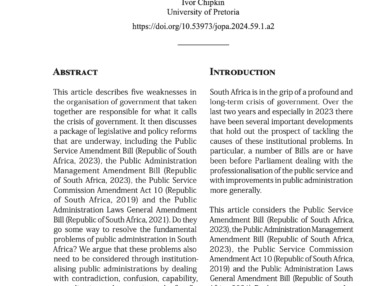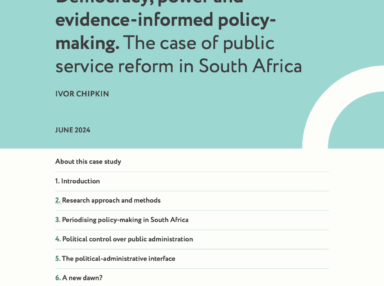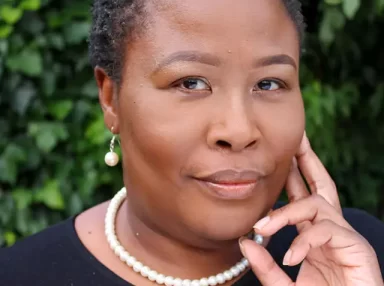Read Ivor Chipkin’s Latest Opinion Piece on News24: “Ramaphosa Will Be Gone in the Dawn”
Ivor Chipkin, our Co-Founder and Executive Director, published a new opinion piece on News24 on June 10. Titled “Ramaphosa Will Be Gone in the Dawn,” the article examines the political landscape in South Africa following the recent elections. You can read the full text on the News24 website or below.
________________________________________________________________________________________
If Ramaphosa is gone in the dawn.
Ivor Chipkin
South Africa’s electorate has delivered the African National Congress a historic defeat. The ANC has fallen from 57% in the 2019 election to below 40%. 71 ANC Members of the National Assembly will soon be unemployed, the vast majority will not have successful careers or businesses or even jobs to go back to. Analysis is correctly focused on the galloping success of former President Jacob Zuma’s, uMkhonto Wesizwe (MK) party, which is only a few months old and already the majority party in KwaZulu-Natal and the third largest in the national assembly. The Democratic Alliance under John Steenhuisen did well, consolidating its base, fending off new, smaller parties and even growing slightly. It has increased its support in black, metropolitan constituencies. The Economic Freedom Fighters, for its part, has stagnated and declined. It was eviscerated in KwaZulu-Natal.
The Democratic Alliance has shown that there is a stable and modestly growing liberal constituency in South Africa. If we include some of the smaller parties that underperformed on Friday, there are roughly 3,5 million voters that support constitutionalism and a market economy.
The EFF and the MK Party are authoritarian, populist parties. They are explicitly anti-constitutional. The EFF would nationalise large parts of the economy and run key sectors through state owned enterprises. There are at least 97 MPs in the next parliament in favour of such measures.
Neither the liberal-democratic bloc nor the authoritarian populists are strong enough to form a majority in parliament, however.
Where does the African National Congress lie along this liberal – nationalist continuum?
This is an important question to consider as coalition talks take place over the next two weeks. What should we make of Cyril Ramaphosa, for example? Many in business and several liberal commentators want him to help remain as President of the ANC to broker a deal with the DA to create a new political centre, one which would protect the constitution and release the private sector.
At less than 40% of the vote, this election has been bad enough for the ANC. The results are a catastrophe for Cyril Ramaphosa personally. He is the first ANC President to see the party lose its parliamentary majority. He has overseen the loss of the second most populous province in the country. He has been humiliated by his nemesis, Jacob Zuma in KwaZulu-Natal.
To the extent that he had one, Ramaphosa’s political project has come apart. He has protected politicians implicated in state capture, overlooked incompetence in his cabinet and tolerated Ministers that have worked against the grain of his major policy initiatives. For this he has been widely slammed as indecisive and aloof. He has, however, brought a modicum of stability to the cabinet and in the African National Congress. This has given him (and/or organised business) enough cover to pursue several important legislative and other technical reforms in the areas of energy and logistics. If there was method in his madness, then Ramaphosa has been the catalyst of illiberal development in South Africa.
What Ramaphosa’s administration has shown, however, is that economic liberals are not automatically political liberals or constitutionalists. This throws another variable into the mix. There is an important political constituency in South Africa that favours economic growth and is also tolerant of corruption and authoritarianism in other areas of policy – an illiberal liberalism. This is where Ramaphosa’s ANC currently stands.
Taken together, coalition negotiations that start from the assumption that South African politics resembles a continuum between liberal democrats and populists overlook a third dimension: illiberal liberalism.
The first thing to note is that an ANC-MK alliance is not a natural one, even if Ramaphosa is gone in the dawn. Zuma’s period in government showed that he was indifferent to professionalism, hostile to the autonomy of economic institutions and favoured direct party-political control of the state. It is improbable, therefore, that he will support initiatives to modernise the state and the economy. An ANC-MK government would likely be fraught and unstable and potentially short-lived. An ANC-EFF alliance might be more tenable if the ANC’s authoritarian tendencies harden and the EFF’s attitude towards statism softens. Even together, however, they do not have enough seats to elect a President. Either way, an ANC-populist alliance would be a disaster both for democracy and for the economy.
Secondly, it is not obvious how democrats are spread across political parties, especially the DA and the ANC. During the period of state capture, South African banks, large corporates and international companies turned a blind eye to criminality and the assault on South Africa’s constitution for lucrative contracts with state agencies or state-owned companies. How many DA voters would be happy to trade economic growth for corruption and a little authoritarianism?
What would an ANC-DA alliance yield? It would strongly favour the interests of big business and likely help push through major reforms to modernise the economy and the state. There might be an improvement in the governance of metropolitan areas like Johannesburg. In the current situation, when the risks from nationalist forces are immediate and pressing, this is the country’s best option, a pro-growth coalition, which would support the professionalisation of the public service and that would be nominally democratic. Such an arrangement, however, comes with acute dangers for democracy. Will the DA make its own Faustian pact if the conditions for economic growth run up against the country’s constitution? Will its donors pressure it to turn a blind eye to corruption and lapses of the rule of law? Will it tolerate growing inequality?
Going forward, a centrist ANC-DA coalition might give rise to another political bloc in South Africa; a Labour party invested in economic growth, modernising the state and with an interest in reducing inequality.
Ivor Chipkin is the Director and Co-Founder of the New South Institute.



